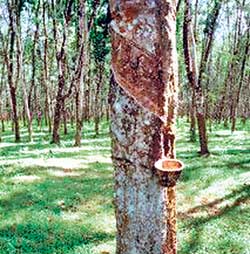
Oil palms, tea, rubber lead the way for Agalawatte record
Oil palms, once a doubtful crop, tea and rubber led the way to result in Agalawatte Plantations Ltd (APL) biggest ever profit and turnover in history – Rs 1.88 billion and a net profit of Rs 165.3 million in 2007. The plantation firm is a Mackwoods Group company. Oil palms has had a rocky development in Sri Lanka after plantation companies turned then unprofitable rubber estates into oil palms, triggering protests from the rubber industry. A foreign manager at a plantation which made the shift was even stabbed by villagers, opposing the change, some years back. Since then rubber has seen a marked turnaround in prices while oil palms is also doing well. Dr. Chris Nonis, Chairman of Agalawatte Plantations, and chairman of the Mackwoods Group, said that this profit, which translates to a record EPS of 6.6 and an increase of 88% on last year, is commendable, considering the unexpected wage increase granted to the workers in November 2007, the escalation of input costs and the negative impact of the previous year’s strike. “All three major crops, tea, rubber, and oil palm, contributed to the bottom line, which is now reaping the benefits of the company’s long term strategy of diversification to ensure sustainability,” he said in the annual report. APL’s rubber yield in 2007 is the highest ever achieved, and denotes an increase of 26% over the previous year. The company harvested a rubber crop of 4 million kg while turnover at Rs 923 million is also the highest on record Strikes resulted in the tea crop easing by six percent against 2006 production but despite this turnover rose by 35 percent to Rs. 859 million. Oil palm showed a profit of Rs 42 million generated from the joint venture cultivation. Nonis, discussing future trends, said that the global economy overall is predicted to have moderate but sustained growth in 2008. Further, global rubber prices should remain firm in 2008, buoyed by continued heavy demand from emerging nations in the Asia Pacific Region; solid, albeit decelerating, growth in world motor vehicle production; and high oil prices. Global tea prices are also likely to maintain their upward trend, more so in the wake of the projected 10% decrease in production in Kenya, Sri Lanka’s main competitor. In addition, continued growth predicted in CIS and Middle East countries, will provide absorptive capacity for the industry. The outlook for palm oil prices too, continues to remain positive in view of the global oils and fats supply shortage, and the volatility of crude oil prices. He sees a fair contribution to the company bottom line from oil palm in 2008. “The critical proviso to the success of our national agricultural crops is industrial peace. In this context, the country needs to be mindful that the profitability of Sri Lanka’s tea and rubber industry is strongly influenced by local production costs and the movement of the global market. With Sri Lanka’s cost of production being substantially in excess of our competitors, and international plantation commodity prices becoming progressively more competitive with the rapid development of low cost producers like Vietnam, India and Kenya, the absence of a productivity linked wage regime will increasingly hinder Sri Lanka’s global competitiveness, and pose a major challenge to the long term viability and sustainability of the plantation industry,” he said in the report. |
|
||||||
|
||||||
| || Front
Page | News
| Editorial
| Columns
| Sports
| Plus
| Financial
Times | International
| Mirror
| TV
Times | Funday Times || |
| |
Reproduction of articles permitted when used without any alterations to contents and a link to the source page.
|
© Copyright
2008 | Wijeya
Newspapers Ltd.Colombo. Sri Lanka. All Rights Reserved. |
